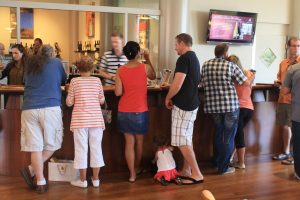People go wine tasting for a variety of reasons. For some it’s to have a pleasant day in the country; for others it’s to celebrate a birthday or impending nuptials. Unfortunately, there are still some who go just to get a little tipsy. For us, the primary reason is to be educated about the vast range of wines and the techniques for making them. Moreover, we love the experience of wine tasting, which is what Power Tasting is all about.
The educational aspect of wine tasting begins, of course, with what is poured into your glass. We long ago learned to swirl the wine, smell it, admire the color and consider the expansion of the taste sensations as we sip and swallow it. More than that, if one is really intent on learning, it is important in any endeavor to ask questions and reflect on the answers.
In discussing the kinds of questions to ask, let us make some assumptions. First, there is no reason to be intimidated. The server is there to aid you in the enjoyment of each winery’s products (and maybe to sell you a little) so all but the most harried or uninterested is going to be friendly and attempt to be helpful. Let us also assume that the server has a basic understanding of the wines he or she is pouring and is able to answer reasonable questions. While it would be valuable if the server were a true educator with deep wine knowledge, that’s not necessary. Finally, lets assume that the tasting room is not packed, with numerous visitors calling for the server’s attention.
Here are some recommendations for the kinds of questions a relatively inexperienced wine taster (or even some more experienced ones) might reasonably ask:
- “Which wines are you best known for?” It is probably easy to tell which are considered the winery’s best wines; they are the ones that are most expensive. But those might not be the ones they sell the most of or for which they have gained their reputation. There’s a winery in Dry Creek that we return to often for their Zinfandels and Cabernet Sauvignons, but when we asked this question we were told that they sell far more Sauvignon Blanc than anything else. This grape is not a particular favorite of ours but we then paid more attention to it at this winery and found we liked it quite a bit.
- “How long until this wine reaches its peak?” Almost every winery will tell you that their wines are ready to drink when they are released and, unless you are tasting in Bordeaux, this is generally true nowadays. But drinkable is not the same as ideal, so this is a reasonable question, especially if you are considering buying some. (You might want to invest in a Clef du Vin – also known as a Wine Key – to get an answer.)
- “What foods would go well with this wine?” Sometimes the answer is written on the back label. You might also get a canned answer: white wines with fish and chicken, reds with meats and cheeses. But perceptive wineries will often make specific recommendations about which wines are ideal for fine dining, barbecues or causal dinners. You might get tips for not over – or underpowering – the food with which you open a particular bottle. This also gives you an idea of how the wine maker positions his or her products.
- “How does this vintage compare with the best in recent years?” No one will tell you that any specific harvest produced substandard wines. But 2014 was spectacular in Napanoma; so was 2010 in Bordeaux and Chianti. So by giving the serve a benchmark, you might get some valuable information. You won’t be told that the wine in your glass is inferior, but you may be told that it is lighter, more fruity or more elegant. And if you’re lucky, the server might open one of the older bottles and let you judge for yourself.
